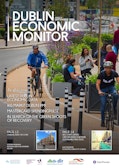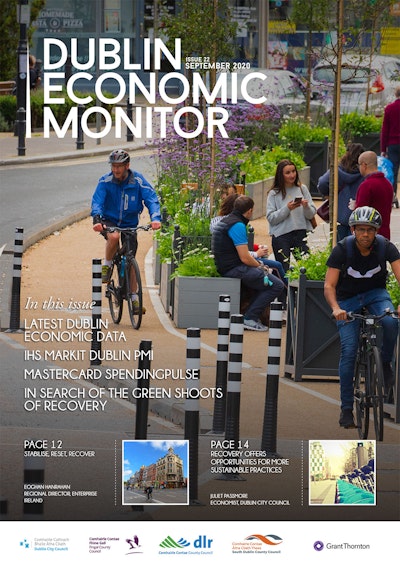The deep and widespread economic implications of Covid-19 for the Dublin economy are demonstrated in the latest Dublin Economic Monitor (DEM), published this morning by the four Dublin Local Authorities.
Activity across the Dublin economy collapsed in the second quarter of 2020 as measures to limit the spread of Covid-19 had severe implications for residents, businesses and visitors alike. Employment levels decreased by over 33,000 YoY, business activity contracted at record rates, while usage of Dublin’s airport, port, and public transport system all fell substantially.
Dublin’s IHS Markit Purchasing Managers’ Index (PMI) captures the impact of the restrictions for businesses in the Capital. The PMI fell to 25.2 (where 50 = no change), signifying the severe contractions which occurred across manufacturing, services and construction in the quarter. The declines in output and new orders during Q2 exceeded those seen during the worst of the global financial crisis. Services were particularly affected, likely due to the importance of the sector for economic activity in the Dublin region.
Weak business activity was further reflected in the office market where vacancy rates increased in Q2, while public transport usage declined by over 76% YoY as a combination of travel restrictions and remote working reduced residents’ and visitors’ movements.
Passenger throughput at Dublin Airport fell by over 98% YoY in Q2 2020, and this had severe implications for the tourism and hospitality sectors in particular. Hotel occupancy rates fell as low as 5.9% in the second quarter as domestic and international travel restrictions limited visits to the Capital. Such low demand for hotel rooms also affected prices, with average daily rates falling by over 40% YoY.
Commenting on the DEM’s findings, Andrew Webb, Chief Economist with Grant Thornton, said:
“Q2 has brought the deep impact of the economic shutdown into sharp focus. Key indicators of the economic health of the city all displayed dramatic downturns. Employment levels in Dublin fell, business activity contracted markedly, while travel patterns in to and around the city region also declined significantly.
As the economy moves tentatively out of lockdown, some green shoots of economic recovery have emerged, with declining numbers now on income supports and signs of increased activity in tourism. Q3 will provide more evidence of the full impact of the downturn and whether the early momentum from the lifting of lockdown is maintained into the autumn.”
MasterCard SpendingPulse™ data sees tourist spending ease
The MasterCard SpendingPulse™, published as part of the DEM, also underlines the deep impact which the global pandemic is having on retail spending in the Dublin economy. Sales fell by 12% YoY in Q2 according to MasterCard, with significant YoY declines recorded in the discretionary and household goods categories in particular. A clear shift towards eCommerce is evident, with traditional bricks-and-mortar retailers such as department stores suffering as a consequence.
Retail spending by tourists in Dublin fell to negligible levels in Q2, with declines of over 50% recorded across each of Dublin’s major international markets. The greatest contraction was in the Chinese market where tourist spending fell by 94.3% YoY. This was followed by the more sizeable tourist markets of France (-84.1% YoY) and the UK (-73.3% YoY).
Michael McNamara, Global Head of SpendingPulse, MasterCard, said on consumer spending:
“Restrictions on bricks and mortar retail activity contributed to declines in retail sales growth rates in Q2 2020 across both Dublin and Ireland. Sectoral divergences were stark with discretionary spending under extreme pressure while expenditure on necessities surged.”


